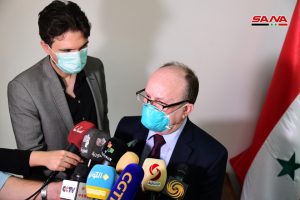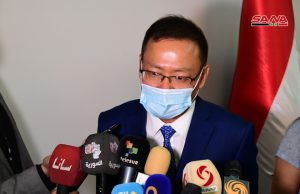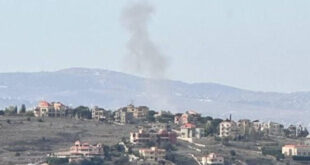Damascus, SANA- Within the framework of the distinguished relations between Syria and the People’s Republic of China, the ministry of higher education and scientific research and the Chinese embassy in Damascus on Tuesday signed a protocol and a receipt document provided by the People’s Republic of China for the Bone Marrow and Stem Cell Transplant Center at the kids University Hospital in Damascus which will be opened soon.
Caretaker Minister of Higher Education and Scientific Research, Dr. Bassam Ibrahim expressed Syria’s appreciation for the Chinese side’s initiative and its contribution to support the launching of Bone Marrow and Stem Cell Transplant Center at the Kids’ University Hospital.
The step will provide its services to hundreds of sick children who suffer from chronic diseases and need special treatment, especially in light of coercive economic measures and the unjust blockade, which made it difficult to secure supplies and necessary medical equipment.
For his part, Ambassador of the People’s Republic of China in Damascus, Feng Biao, said that his country supported Syria at international forums during the past years to preserve its sovereignty and territorial integrity, and it has always refused external interference in its internal affairs.
He indicated that China has provided humanitarian aid to Syria, especially medical supplies after the spread of Coronavirus pandemic.
The Ambassador added that the Chinese side is a Close partner and keen to work with Syria hand in hand to establish the best relationships and achieve common interests so to serve and fulfill the aspirations of the people of the two countries.
Dr. Majd Khader, Director of the Bone Marrow and Stem Cell Transplant Center at the hospital said that this grant will contribute to setting off the first transplants at hospital for cancer, thalassemia, sickle cell disease and immunocompromised patients, expecting work will be finished and received within the next two months to start transplantation operations by the end of this year or the beginning of next year, indicating that the center can do about 30 to 40 transplants per year.
Manar Salameh/ Mazen Eyon
 Syrian Arab News Agency S A N A
Syrian Arab News Agency S A N A



